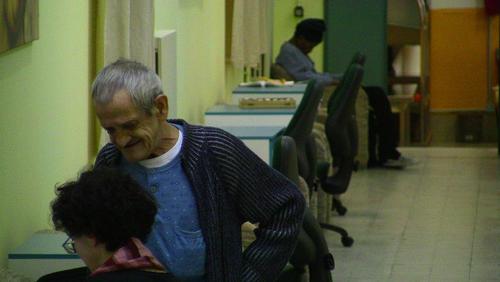When a patient is discharged from hospital after surgery or treatment for acute illness, being in a protected environment to continue therapy until complete recovery is paramount. Yet for the homeless, such an option is impossible, resulting in relapses and impeding their full recovery.
Variety of pathologies
In Italy the biggest concentration of people considered homeless live in the town of Milan (more than 13,000). Approximately 3,500 of them sleep on the streets. In 2013, Médecins Sans Frontières (MSF) conducted an assessment of the health situation of homeless people in the city, including both migrants and Italian nationals, that were discharged from hospitals during the last two years. According to the assessment, a total of 850-900 patients still required medical follow-up for a variety of pathologies or health problems: respiratory infections, pneumonia, skin infections, but also cases requiring constant medical attention such as heart, liver or kidney disease, HIV/AIDS and tuberculosis.
20-bed facility
As these pathologies are extremely difficult to stabilize among the homeless, at the start of 2014, MSF opened a 20-bed health facility to address the needs of homeless people still requiring medical follow-up. Inside the facility, which works complementarily with the local health system, the MSF team provides medical and nursing care on a 24-hour basis.
Risk of relapse
“Homeless people are vulnerable as they don’t have shelter, suffer from malnutrition and generally live in poor conditions. When released from hospital, and if not able to continue their therapy, they risk relapses to their previous illnesses and having to be re-admitted to the hospital or even go to an emergency room”, notes Gianfranco De Maio, MSF field coordinator. “In our health facility we offer a continuation of medical care for these people. In the first weeks of activity, we received many requests both from hospitals in Milan and from outside the municipality, assisting more than 30 people who needed to continue therapy, providing medicines or dressing wounds.”
The MSF patients are almost exclusively men, carrying with them dire stories of solitude linked to family problems or financial difficulties that the current economic crisis in the country only exacerbates.
Facing life with new determination
Maria, born in Brazil but living in Italy for almost twenty years, is the first female patient to come to the facility. While trying to recover from drug addiction, she was admitted to the MSF facility to recover from a major surgery. She now faces life with new determination: “It’s been two years since I saw my son and I want to regain my relationship with him. This is why once I am discharged I will go to a recovery centre and turn the page. Leaving this place will be sad, because here I found a family environment. I think that this project can really help people that, like me, live on the streets and don’t have any other help.”



